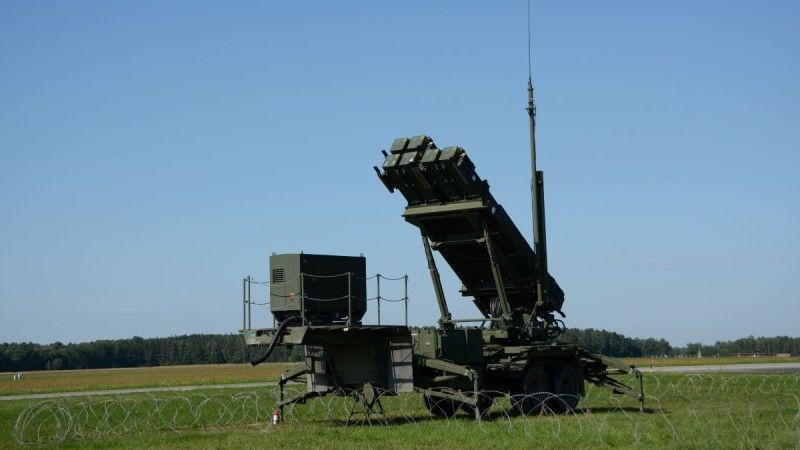Defence Policy
PM Tusk: European Shield Complements Our Systems, It Is Not An Alternative Solution

Photo. Lt. Bartosz Jóźwik
The involvement in the European air defence shield initiative is not an alternative to the programmes pursued by Poland, it is a complementary element, said PM Donald Tusk. He declared cooperation with the US, and the UK, would continue. He accused the PiS (Law and Justice) government of delaying the programme aimed at establishing the Polish IAMD.
Air defences, within the context of the recent airstrikes launched by Iran against Israel, and Russia against Ukraine, have been one of the key issues discussed during the parliamentary debate. By exception, that debate also involved the Chief of the General Staff, General Wiesław Kukuła, and the Operational Commander, Div. Gen. Maciej Klisz, along with the Head of the National Security Bureau, Jacek Siewiera. Minister expressed a belief that President Andrzej Duda would endorse the involvement in the European Sky Shield Initiative, should it take into account the use of systems selected by Poland, like the CAMM missiles, IBCS system, and Polish-made VSHORAD missiles.
As Tusk said, this special formula was adopted in the wake of „radical growth of the tensions in the Middle East”, while the government received „somewhat calming” information on the Polish troops deployed to Lebanon.
„Iran’s action undertaken against Israel, according to what I was told by the Generals, was very similar to the last massive action that Russia carried out against Ukraine. According to the analytical effort undertaken by our officers, it cannot be ruled out that the next phase of the Russian aggression could take that appearance, hence one needs to conduct an in-depth study of any attack like that, as conclusions can be drawn from Poland here”, he said.
He also pointed to “one key difference”, saying that “in the Israeli case more than 90% of rockets, drones, and ballistic missiles have been shot down thanks to the Iron Dome, and other systems that protect the sky over Israel”, while most of the threats was neutralized not while in the Israeli, but in the Iraqi and Lebanese airspaces, earlier on. “Ukraine”, he added, “was able to down 30% of the threats launched against it”.
As he noted, the security requires control over its airspace, „hence our urgent action is necessary to cover years of backlog”.
According to the PM „Poland finds itself in a situation more difficult than it could be in”, had it not been for the decisions made during the early days of the PiS’s term of office, when the Polish Ministry of Defence was led by Antoni Macierewicz. Turk recalled that the Patriot system was selected for Wisła MRAD, during the term of office of the PO-PSL coalition. He added that the decision was questioned by Macierewicz, also recalling that two batteries were procured, instead of the 8 envisaged in the original plan, once the MoD was taken over by Mariusz Błaszczak. (Agreement concerning another 6 batteries was covered by the Phase II of the Wisła programme, last year - editor’s note).
Tusk also pointed out that Macierewicz cancelled the UCAV procurement - a small number of such systems was procured, after the war in Ukraine broke out, PM said. As he stated, most of the procurement was done without any underlying strategy, as „this element was destroyed by Macierewicz, at the beginning of the PiS’s term of office”. „This was not a consequence of strategy, it was rather a result of panic in which PiS found itself once the war broke out”, he said.
“Our task today is to use any capability, of any ally, any system, to arm the Polish sky (…) not to face the threat faced by Ukraine today, and thus I was really satisfied with the opinion provided by the Generals and Minister Siewiera, suggesting that my efforts for Poland to become a part of multiple systems that would form a relatively tight shield, do make sense”, he said.
He assured that he is talking to leaders visiting Poland, and discussing “in what way the segmented Europe, when it comes to the protection of our skies, can be made more integrated, for those systems not to compete, and for ideas and concepts to quickly be turned into practice. And thus we will also be cooperating within the framework of the European Sky Shield initiative”, he said.
„And I do not care at all, about the fact that the Germans were the key initiators”, he said, asked about Andrzej Duda’s reservations - the President referred to ESSI as a „German business project”.
„I do not know the profile of doubts expressed by Mr. President. For me it remains irrelevant who has what business in the defence matters, what is relevant for me is when Poland would be made more secure”, he said, noting that sales of armament bring profit to all states engaged in that sort of trade. He noted that the Arrow 3 system procured from Israel would be a part of the German air defences.
“I would rather hear Mr. President telling me why over 7 years he has been tolerating, or indifferent to a complete collapse, when it comes to the readiness of the Polish army in the event of war. We are not referring to the last couple of months, we are speaking about almost 10 years.”
„We will obviously still be working with the British. We will be developing - as this is not an alternative, but a complementary asset - our Pilica-Narew-Wisła system. We will also be working on proprietary counter-ballistic capabilities”, he stressed. He added that „cooperation with the United States will still play a key role”, and contracts signed with South Korea will also be continued, with „all of the deficiencies that they entail”.
He stressed that the Polish ESSI participation is not an alternative option, it is a complementary course of action alongside the existing programmes. “Everyone who will be able to help us protect the Polish skies will be viewed by me, as a potential partner and ally”, he said.
Jacek Siewiera, Head of the Presidential National Security Bureau said that he does not “see a clear conflict of stances regarding the matter of securing the Polish airspace, between the Prime Minister, and the President”.
„When it comes to the European Sky Shield project, it is also a business project, as the whole readiness of the European states for defending themselves also has an economic and industrial preparation profile, with them getting ready to conduct a defensive operation”, he added.
Siewiera said that he proposed to the German Chancellor’s security advisor Jens Plötner to work together on a project that initially „involved an offer of joint effector procurement” for the IRIS-T system that has proven its effectiveness in Ukraine.
He added that a joint missile defence shield cannot be established without capabilities of coordination and detection, also without radars deployed to Poland. As he said, „Back then, what was missing was the inclusion of the Polish industry offering two perfected radars, active and passive one, already integrated with the Wisła system”, and they can be easily offered to the allies. The use of the British CAMM-ER missiles and the manufacturing of those in Poland also were not taken into account. He added that given that the current „menu proposed to our European partners” would include CAMM and IRIS-T effectors, extra funds for manufacturing the Polish VSHORAD systems should also be taken into account. „If those conditions are met, involvement and partnership within the framework of the European missile defence shield cannot be ruled out, it is exactly the opposite”, he said.
Siewiera said that the brain for the European Sky Shield already exists and that the IBCS system selected by Poland alongside the Patriot system is playing that role - Germany does not have the IBCS at its disposal. „If these assets are not included in the Polish-German European Sky Shield initiative, with the Polish industry’s capacity taken into account, the President will surely be endorsing that form of reinforcement of the Polish security”, he assured.
The project initiated by Germany, in response to the Russian aggression targeting Ukraine, assumes that assumes that a joint, layered air defence system would be established. The ESSI letter of intent was signed by the NATO Ministers of Defence at a meeting in 2022, and back then Finland was still playing a partner role. Yet, the initiative involved 19 nations. Another protocol was signed by 10 nations in the autumn of last year, currently, the group involves 12 states - including neutral Switzerland. Back then Italy and France were not a part of the ESSI initiative. PiS approached the initiative with a reserved stance, and KO also announced the will to participate in that format of cooperation.
